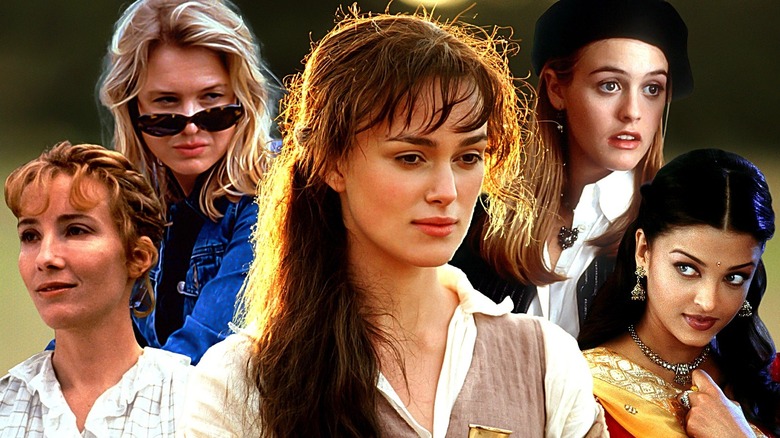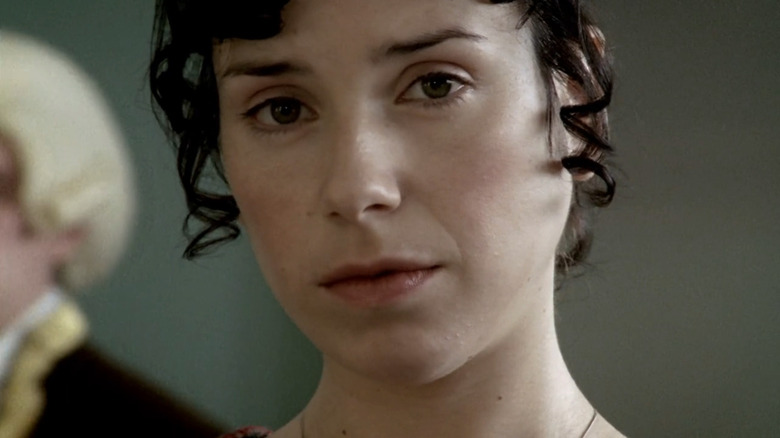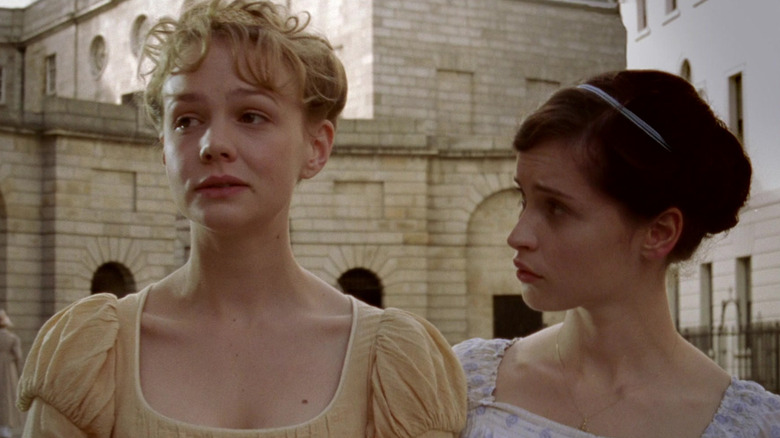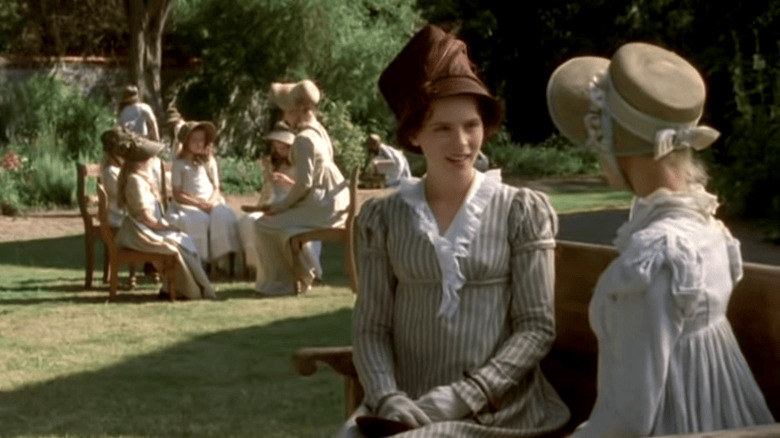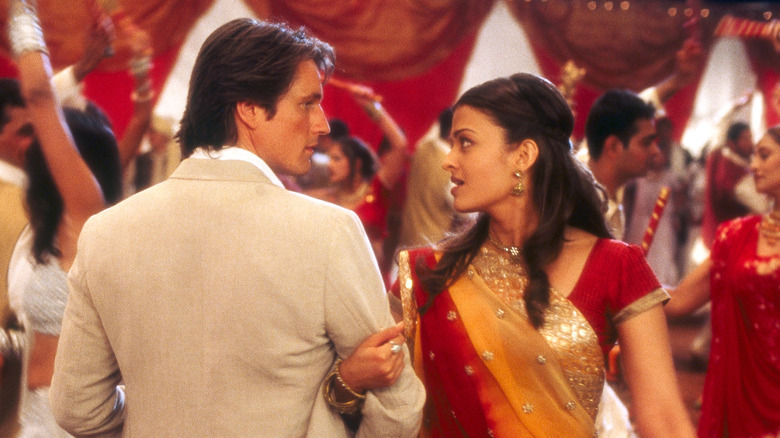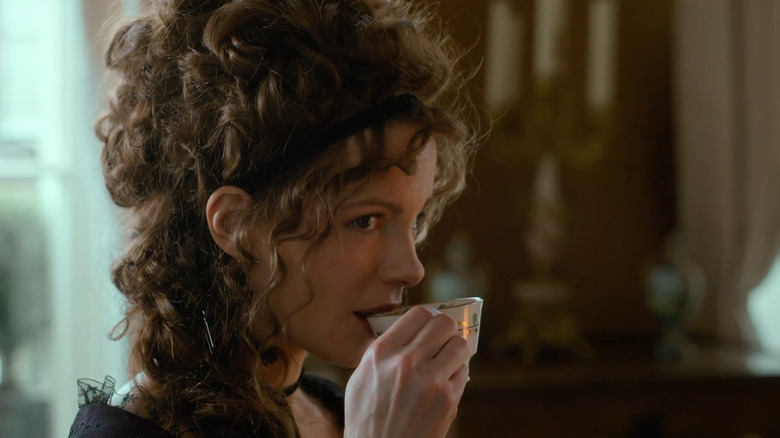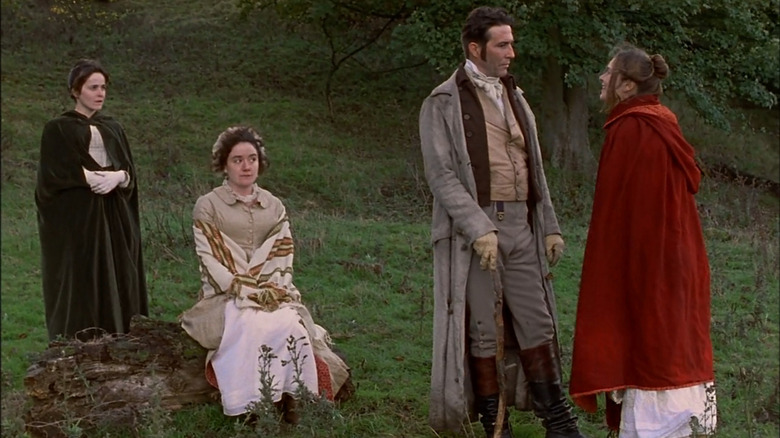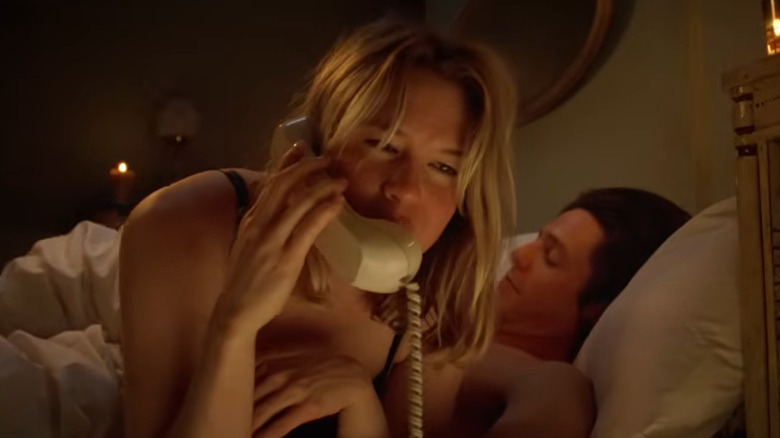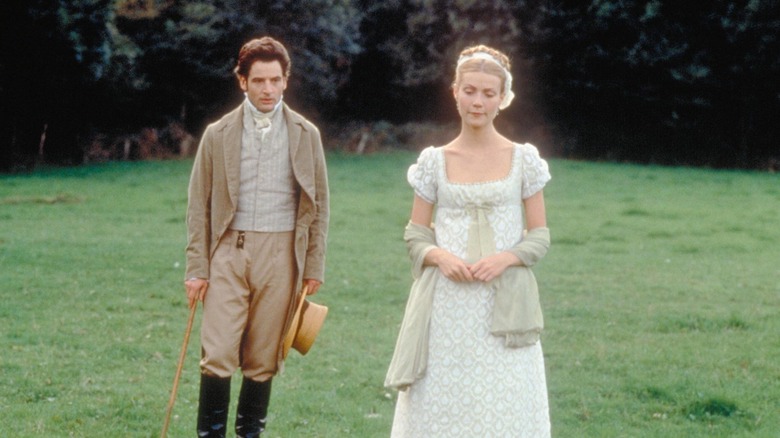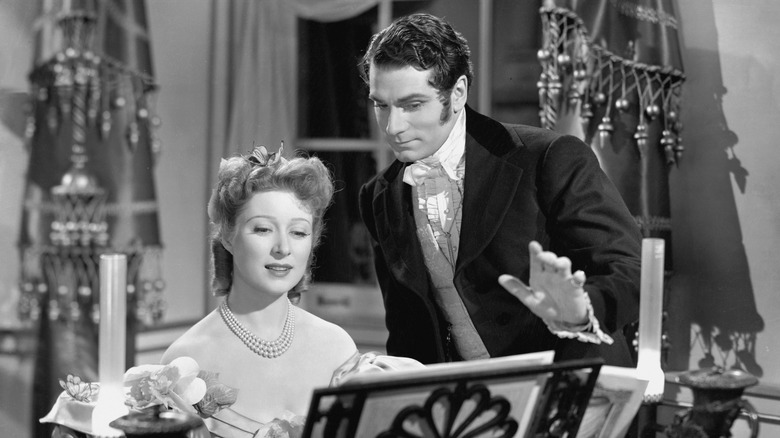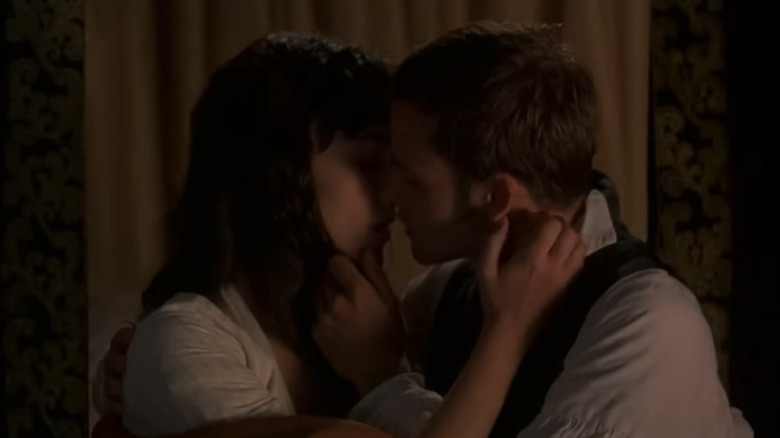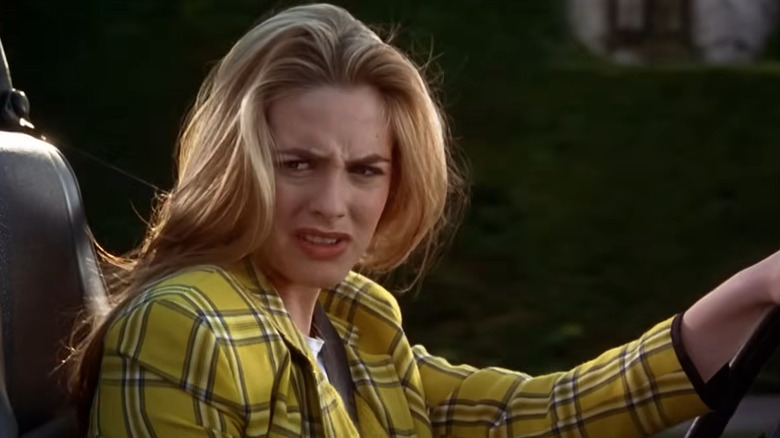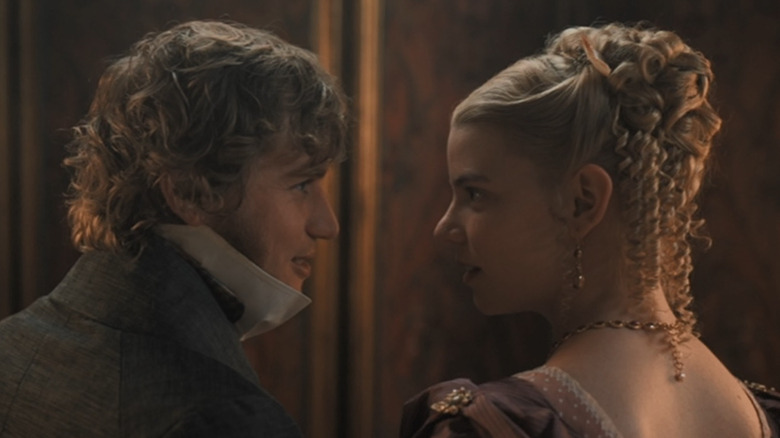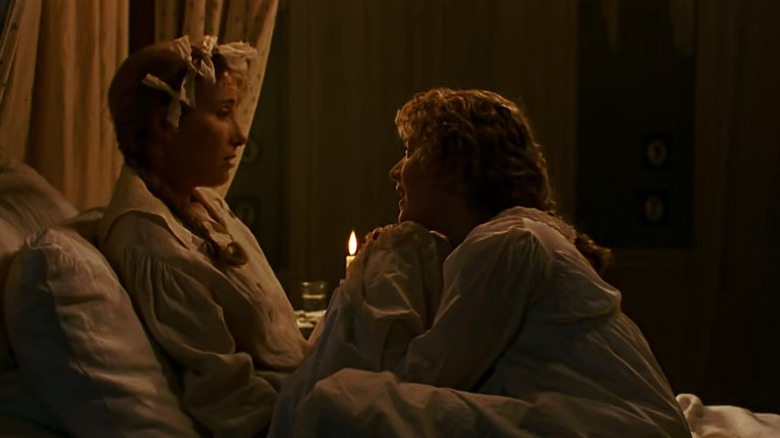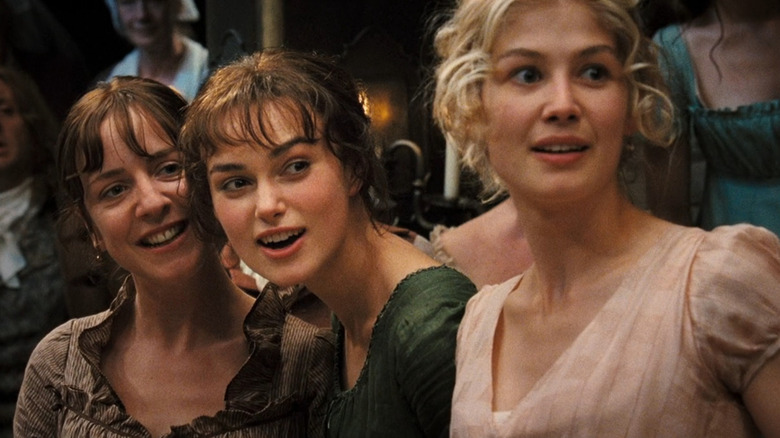The 15 Best Jane Austen Movies, Ranked
Jane Austen needs no introduction. She's the original rom-com queen, writing novels in Regency-era England that gently satirized class and gender roles while also giving her readers classic romances between characters who have stood the test of time. So when it comes to novelists whose work has been adapted for the screen on a fairly regular basis, Jane Austen is right up there with Stephen King.
Year after year, we get different Jane Austen interpretations of her most popular novels, some placed within an appropriately period setting, others given a modern-day update. But no matter when they take place, they've all got that special something that allowed Jane Austen to stand the test of time: relatable heroines and their lovable but occasionally toxic love interests.
Although there have been some truly excellent Jane Austen miniseries adaptations (we're looking at you, 1995 version of "Pride & Prejudice" with Colin Firth climbing out of a lake), for the purposes of this piece, we're focusing on the film versions of her work. From misunderstood intentions and broken courtships to second chances and happily ever afters, these are the best Jane Austen movies.
Persuasion (2007)
Obviously, all of Jane Austen's novels are romantic, but there's something more mature and bittersweet about the relationship between Anne Elliott (Sally Hawkins, who also knows how to crush it in horror movies) and Captain Wentworth (Rupert Penry-Jones) in "Persuasion." Convinced by her family and closest friend that Wentworth was not a good match for her, Anne rejected his proposal, only to regret it as she grew older and more sure of herself. At the time "Persuasion" takes place, she's in her late 20s and is considered a confirmed spinster whose only role in life is to manage the whims of her extremely demanding father and sisters.
But then Wentworth reenters the picture, now wealthy, established, and extremely eligible. How can Anne ever account for having been so easily ... well, persuaded in her youth? Sally Hawkins as Anne is the main draw here, imbuing the character with such a quiet dignity, filled with kindness but a deep reserve of melancholy that only occasionally comes to the surface. The ultimate second chance romance, "Persuasion" can go toe-to-toe with any of the best Austen adaptations.
Northanger Abbey (2007)
Jane Austen's novels are often light and frothy, focusing largely on the romantic misadventures of the landed gentry living comfortable lives in the English countryside. But in "Northanger Abbey," one of her least-known gems, she interacts with and thoroughly satirizes the Gothic genre. Catherine Morland (Felicity Jones in one of her earliest leading roles long before "Rogue One") is an impressionable young woman who has had her worldview shaped by her obsession with Gothic novels (relatable).
When Catherine embarks upon an adventure of her own, in which she is the heroine she's read so much about, she takes a few wrong turns courtesy of her endless supply of novels and the well-intentioned but misguided advice of her best friend Isabella (Carey Mulligan, also in the early days of her career). J.J. Feild contributes admirably to the production as well, bringing to life one of Jane Austen's most underrated but swoonworthy male leads. As one of a series of Austen adaptations released in the mid-2000s by ITV, "Northanger Abbey" has a charm all its own.
Emma (1996, with Kate Beckinsale)
The Jane Austen novel "Emma" was in vogue during the mid-1990s — between 1995 and 1996, there were three feature film adaptations of the classic matchmaking tale. The least compelling of these, but still worthy of a watch for fans of the story, is the 1996 adaptation starring Kate Beckinsale as Emma Woodhouse. It suffers from some production value issues, and its status as a made-for-TV film is made all too clear over the course of its brisk 90-minute runtime.
Beckinsale is a talented actress and can do Jane Austen justice standing on her head, but the casting of Mark Strong in a thoroughly distracting wig as Mr. Knightley is perplexing. Though he's a talented actor, he's still not quite a natural fit for the character. The performances are strong, but it suffered in comparison with the "Pride & Prejudice" series released the previous year, which writer Andrew Davies had previously worked on. This was largely a result of how much storytelling needed to be condensed into just an hour and a half, while his earlier project had the luxury of several episodes to allow the narrative to breathe. Nevertheless, Beckinsale provides one of the best interpretations of Emma we've seen.
Bride & Prejudice
Many Jane Austen adaptations have made the jump across the centuries, attempting a modern spin on a classic tale. But of the ones that adapted Austen into an entirely different cultural setting, "Bride & Prejudice" is undoubtedly the most famous. Set in early 2000s India, it revolves around the romantic exploits of the eldest two Bakshi daughters, Lalita (Aishwarya Rai Bachchan, in a take on Elizabeth Bennet) and Jaya (Namrata Shirodkar as Jane Bennett). Together, they're wooed by the British-Indian lawyer Balraj (Naveen Andrews as Mr. Bingley) and the rich American Will Darcy (Martin Henderson), although their courtship is not without its occasional bumps.
Vibrant and stylistic, "Bride & Prejudice," it blends the classic romance of the novel with the colorful musicality of a Bollywood production, brought to us by director Gurinder Chadha, no stranger to this sort of cross-cultural melding on the big screen after "Bend It Like Beckham" and "Bhaji on the Beach."
Love & Friendship
Mothers in Jane Austen novels are often either nonexistent or rather frustrating, but this is probably preferable to the kind of matronly figure we see in Lady Susan (Kate Beckinsale), who any modern daughter would go no contact with. A bit older than the average Jane Austen heroine, Lady Susan is a shrewd social climber and a determined flirt whose audaciousness knows no bounds as she attempts to secure eligible matches for herself and her teenage daughter Frederica (Morfydd Clark).
Although there's a full ensemble of characters in this largely unknown Austen work, Beckinsale as Lady Susan dominates the proceedings through sheer force of will. Her wit and sheer bloodymindedness may perpetually exasperate her nearest and dearest, but never let it be said that she doesn't get what she puts her mind to. What's more, in the hands of Beckinsale at her very best and director Whit Stillman, "Love & Friendship" gives us Austen's most liberated, sexually frank, and genuinely hilarious heroine.
Persuasion (1995)
Released just a few months after "Sense & Sensibility" put Jane Austen films back on the map, this version of "Persuasion" that most classic fans swear by. The simmering chemistry between Amanda Root as Anne Elliott and Ciaran Hinds as Captain Wentworth is undeniable, providing the romantic force of the film. "Persuasion" is not a flashy romance, but it's the grounded story of two people who had a strong emotional connection in their youth and are rediscovering each other now that they're older and wiser.
As such, the film has a unusually realistic aesthetic, with plain costuming and minimal makeup. It has a refreshingly lived-in quality that stands in defiance of many other period dramas, with luxuriate in lush costumes and location shoots on palatial estates. Like Anne herself, this production of "Persuasion" is purposefully understated, allowing the strong emotions and longing of the lead characters to speak for themselves.
Bridget Jones's Diary
Name a more iconic 2001 trio than Renée Zellweger, Colin Firth, and Hugh Grant. We'll wait. "Bridget Jones's Diary" may play fast and loose with its adaptation of "Pride & Prejudice," and it may be the film that introduced the idea that 136 pounds was massively overweight to a generation of impressionable female viewers, but what can we say? It's also a lot of fun. Renée Zellweger plays the charmingly quirky Bridget Jones, who has decided to commit to revamping her life in the hope of finding a man. (She's 32, you know, and her bones are turning to dust as we speak.)
Enter Colin Firth and Hugh Grant (the latter of which joined because of director Richard Curtis), her two prospective love interests, each of whom are charismatic and engaging in their own ways. What's a girl to do? "Bridget Jones's Diary" performed so well that it earned Zellweger an Academy Award nomination, and generated a series of sequels including "Bridget Jones: The Edge of Reason," "Bridget Jones's Baby," and "Bridget Jones: Mad About the Boy."
Emma (1996, with Gwyneth Paltrow)
1996 was a year when Jane Austen mania collided with peak Gwyneth Paltrow, so it's no surprise that she was tapped to play the lead in the major theatrical release of "Emma." Her version of Emma is played like the most popular girl at your high school, and some of her digs end up feeling a bit more mean-spirited than thoughtless. Still, although most would agree that she's hardly the definitive Emma, she's surrounded by an incredible supporting cast who bring weight and humor to each of their roles.
Ewan McGregor sparkles with youthful energy as Frank Churchill, the prodigal son of the village whose charisma has everyone eating out of the palm of his hand. Toni Colette is masterful as Emma's pet orphan Harriet Smith, giving her so much more nuance than even the original novel can claim. Jeremy Northam is incredibly endearing as the forthright, honorable Knightley, whose personality balances out Emma's beautifully. "Emma" was nominated for two Academy Awards, ultimately taking home the Oscar for Best Original Score.
Pride and Prejudice (1940)
One of the earliest Jane Austen adaptations (there was a production of "Mansfield Park" released in 1930, but it was considered lost for 60 years and is still not widely available for viewing), the 1940 version of "Pride and Prejudice" has a lot to its credit. First of all, it has Laurence Olivier and Greer Garson in the lead roles of Mr. Darcy and Elizabeth, and they both have talent to spare. It's a period drama born out of the studio system, when no expense was spared to provide the most opulent costumes and set pieces for their characters to promenade through.
If it succeeds more as a standard historical romance than specifically as an adaptation of "Pride and Prejudice," it's still a well-constructed drama that won over audiences in 1940 and does justice to the story it shares a title with (and it's also the highest rated adaptation on Rotten Tomatoes). The New York Times critic Bosley Crowther raved about its stars, writing, "Greer Garson is Elizabeth — 'dear, beautiful Lizzie' —s tepped right out of the book, or rather out of one's fondest imagination: poised, graceful, self-contained, witty, spasmodically stubborn and as lovely as a woman can be. Laurence Olivier is Darcy, that's all there is to it—the arrogant, sardonic Darcy whose pride went before a most felicitous fall."
Mansfield Park (1999)
The 1999 version of "Mansfield Park" shares a title and a general storyline with the Jane Austen novel, but it never allows its source material to stand in the way of making a good movie. It isn't beholden to the parts of "Mansfield Park" that are less appealing, shaving off some of the rougher edges of its main characters. Frances O'Connor's version of Fanny Price is still treated as a quasi-servant, her position in the family left ill-defined from childhood, but her spirited self-awareness of her plight makes her feel like a much less passive character.
Meanwhile, they cast Jonny Lee Miller, who has never met an Austen hero he couldn't make charming and lovable, as Edmund, and the two have an electric chemistry that makes their inevitable union all the more poignant. Rather than merely regurgitating plot points from "Mansfield Park," director Patricia Rozema engages with the text, bringing shades of feminism and commentary on the slave trade to the forefront. It may not be the most loyal adaptation of a Jane Austen novel, but it's certainly one of the most interesting.
Clueless
"Clueless" is basically the definitive modernization of a Jane Austen text, and shows us what it can look like when this type of storytelling — always a bit of a swing for the fences — is done right. It uproots the story of "Emma" from southern England to Southern California, where Cher (Alicia Silverstone) is the queen bee of her Beverly Hills high school. When Tai (Brittany Murphy) transfer to her school from a much less chic locale, Cher decides that she's going to take in upon herself to give Tai a makeover and help her fit in among the wealthy denizens of their community. But although Cher considers herself to be a matchmaker and makeover extraordinaire, she's still got a lot to learn, and sometimes her schemes end up causing more harm than good.
"Clueless" took the 1990s by storm, becoming one of the rare films that shapes youth culture rather than just trying to mimic it. As a result, "Clueless" is now an institution, with a legacy that has stretched across multiple generations and created its own unique lexicon.
Emma (2020)
"Emma" was released just weeks before theaters went into shutdown mode in March 2020 in response to the COVID-19 epidemic, and as a result, it didn't get the credit it deserved as one of the most lush, vibrant Austen adaptations we've seen in quite some time. Director Autumn de Wilde fills every frame with color and extensive set decoration, giving Emma's world a uniquely stylish aesthetic. Furthermore, Anya Taylor-Joy is a revelation as Emma, as we see both her genuine affection for her friends as well as her occasional thoughtlessness and haughty demeanor.
In her hands, the sometimes unlikeable Austen heroine comes across as nuanced and utterly human. She truly wants the best for the people in her life, even if she may be blind to the fact that she doesn't always know what's best for them. Johnny Flynn is a perfect choice for Knightley, whose level-headedness and clear sense of honor are in constant conflict with his growing attraction to Emma. "Emma" never shies away from its more comedic elements, offering a take on the novel that is light on its feet and fresh as a daisy.
Sense & Sensibility
The 1995 Ang Lee adaptation of "Sense & Sensibility" is so definitive that few others seemed to want to compete with it. Until 2024, it was the only English-language film adaptation of one of Jane Austen's most popular novels, after which Hallmark released its own version. (And as of June 2025, there are reports of an additional production in the works starring Daisy Edgar-Jones.) But for most viewers, this is the first and final word on the Dashwood sisters, forced into reduced circumstances after their father's death but still determined to take charge of their own romantic fates.
The producers took a real chance in having Emma Thompson write the screenplay for the film as a first-time screenwriter, but it pays off in spades, as she demonstrates such a deep understanding of the material that it's difficult to imagine anyone else doing it credit. "Sense & Sensibility" was a massive hit, earning seven Academy Award nominations and winning for Best Screenplay, in a testament to Thompson's efforts. It also marked the beginning of a huge resurgence in Jane Austen adaptations, as studios were given proof of their potential viability at the box office.
Pride & Prejudice (2005)
"Pride & Prejudice" is Jane Austen's most acclaimed novel, and the 2005 version is its very best big screen adaptation, so it was an easy choice to give it the top spot. (Luckily, miniseries aren't eligible here, otherwise this and the 1995 version would be in quite a dogfight.) Directed by Joe Wright, "Pride & Prejudice" is grounded in a rich, textual period reality that showcases not just the glamorous balls and romantic moments, but quieter scenes that lend depth to each of the characters.
We get Mr. Bennet (Donald Sutherland) comforting Mary (Talulah Riley) after she is humiliated when he stops her from commandeering the pianoforte all night at the ball. There's Mr. Darcy (Matthew Macfadyen) and Mr. Bingley (Simon Woods) workshopping his proposal to Jane (Rosamund Pike) after his initial attempt went pear-shaped. Mrs. Bennet (Brenda Blethyn) devastating hungover after too much punch at the Netherfield Ball. And of course, the now-famous hand flex after Mr. Darcy assists Elizabeth (Keira Knightley) into her carriage. It has a phenomenal cast, it's gorgeously shot, and it's an Austen adaptation that truly understands the spirit of the novel. What more could you ask for?
